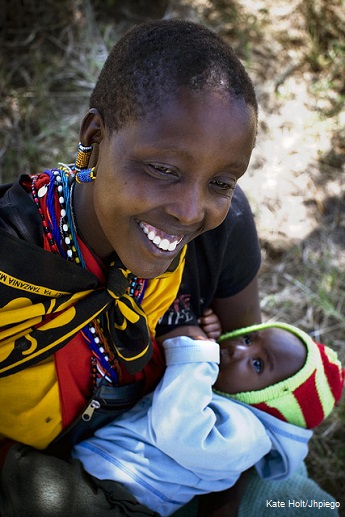Integration of Services
Postpartum unmet need for family planning (FP) is high in the majority of USAID priority countries and multiple strategies are needed to reach women with related care. Integration of services — either at the provider level, through linked services in a given service delivery point, or through coordinated referrals — takes advantage of existing health contacts. In some cases, integration offers distinct advantages; sometimes, integration can overwhelm a weak system.
Integration should occur during antenatal care, whether in a facility consultation or during a home visit by a trained community health worker. It should occur at the time of birth, prior to discharge from the maternity. And it can occur during postnatal contacts — at a facility or in the community — including during contacts for child immunization or growth monitoring.
MCSP’s reproductive health, nutrition and immunization activities were designed to work together to:
- Generate evidence on the impact of integration on both immunization and FP outcomes; and
- Better understand the conditions when integration offers win-win advantages and when integration should be avoided.
In any country, an integrated service delivery approach should be developed in close collaboration with child health, nutrition and immunization stakeholders. MCSP drew lessons from patient tracking efforts that link across health services and allow for improved continuity of care and follow up of postpartum women and babies. Opportunities to record and track reproductive intentions over time and offer timely reminders of when to start an FP method were components of several MCSP implementation research studies.
Working across nutrition and FP, MCSP continued to explore new strategies for improving the understanding of return to fecundity, increasing timely uptake of modern FP methods after childbirth, and promoting optimal maternal, infant and young child nutrition (MIYCN) practices.
In the Mara and Kagera regions of Tanzania, for example, MCSP re-envisioned the way postpartum family planning (PPFP) and MIYCN information was communicated. By identifying socio-cultural cues for birth spacing or positive deviant nutritional behaviors, simplifying messages, and using innovative social and behavior change communication approaches, we catalyzed behavior change. MCSP refined, tested and integrated messages on return to fecundity, PPFP, and MIYCN through a multi-pronged approach that utilized formative research as a basis to gain an understanding of barriers and motivators for optimal PPFP and MIYCN practices.
By examining the use of services and identifying the most appropriate channels and approaches for communicating culturally appropriate information, we disseminated FP messages at the household, community and health facility levels. This included using radio and song, training community health workers through an e-Health platform, involving health workers at the dispensary level, and engaging breastfeeding support groups, local champions, and civil society organizations. Ultimately, we aimed to advance the understanding of factors affecting timeliness and knowledge of postpartum contraceptive uptake and optimal MIYCN practices, recognizing that health systems considerations such as commodity availability are also critical for stimulating demand.
MCSP continued to co-chair the FP-Immunization Working Group with Pathfinder, which involved hosting face-to-face and virtual meetings, and updating and promoting the FP-Immunization toolkit. Similarly MCSP co-chaired the MIYCN-FP Working Group with the SPRING program, which included hosting meetings, participating in sub-committees, and updating and promoting the MIYCN-FP toolkit. These two working groups eventually joined for face-to-face meetings, further capitalizing on synergies between efforts and sharing insights on integration of services and programs.

